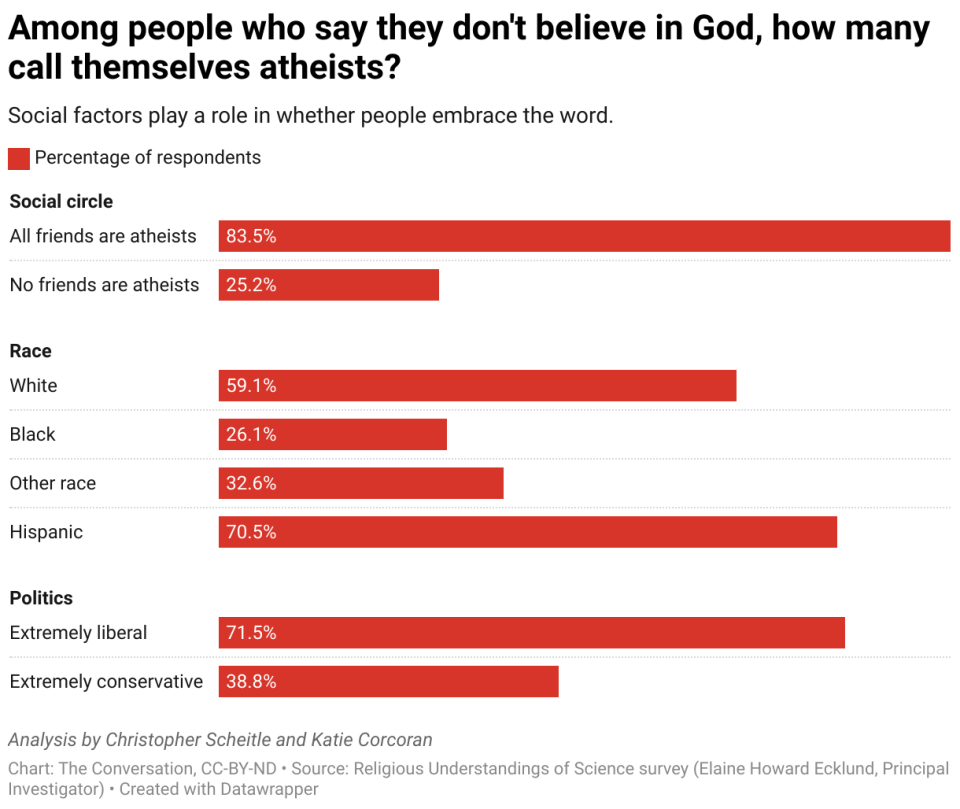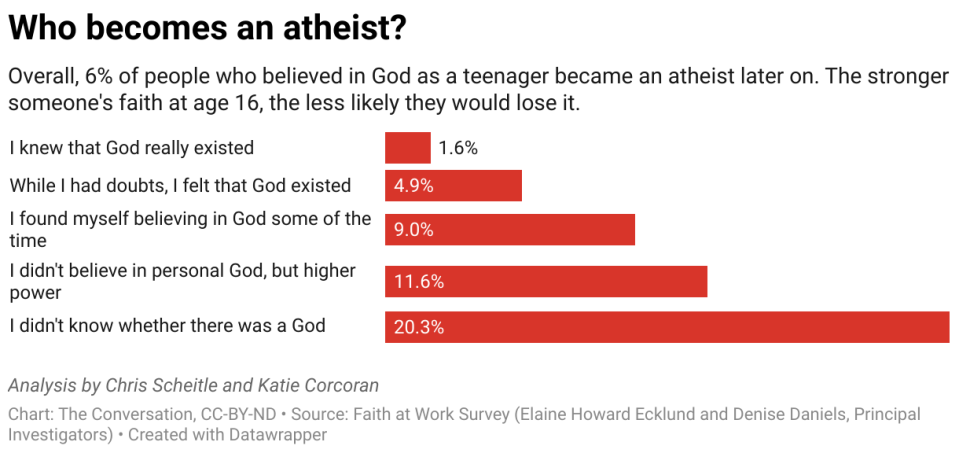The number of individuals in the United States who do not identify as part of any religion has increased significantly in recent years, and the “nones” are now larger than any single religious group. According to the General Social Survey, in the 1970s people without religious affiliation represented only 5% of the U.S. population. This rate started to increase in the 1990s and is currently around 30%.
At first glance, some might think this means that approximately 1 in 3 Americans is an atheist, but this is far from true. In fact, only 4% of U.S. adults identify as atheists.
As sociologists studying religion in the United States, we wanted to learn more about the difference between these percentages and why some people identify as atheists while others do not.
Many shades of ‘No’
The religiously unaffiliated are a very diverse group. Some still attend services, say they are at least somewhat religious, and express some level of faith in God; However, their tendency to do these things is lower than individuals who identify with a religion.
There is even diversity in how non-religious individuals define themselves. When asked about their religion in surveys, individual responses include “agnostic,” “no religion,” “nothing in particular,” “none,” etc. It is located.
Only 17% of people with no religious affiliation openly identify as “atheists” in surveys. Atheists often reject religion and religious concepts more actively than other religiously unaffiliated individuals.
Our latest research examines two questions about atheism. First, what makes an individual more or less likely to identify as an atheist? Second, what makes a person more or less likely to adopt an atheistic worldview over time?
Beyond belief and disbelief
Consider the first question: Who is likely to identify as an atheist? To answer this, we first need to think about what atheism means.
Not all religious traditions emphasize belief in a god. However, in the US context, especially in traditions such as Christianity, atheism is often equated with saying that one does not believe in God. But in one of our surveys, we found that only half of U.S. adults who say “I don’t believe in God” would choose “atheist” when asked about their religious identity.
In other words, rejecting belief in God is by no means a sufficient condition for identifying as an atheist. So why do some individuals who do not believe in God define themselves as atheists, while others do not?
Our study found that beyond an individual’s disbelief in God, there are a number of other social forces associated with the likelihood of identifying as an atheist, particularly stigma.
Many Americans view atheists with suspicion and distaste. Some social science studies, especially in the United States, include questions about tolerance towards racists and communists, as well as questions about how tolerant people are of atheists.
This stigma means that being an atheist comes with potential social costs, especially in certain communities. We see this dynamic emerging in our data.

For example, political conservatives are less likely to identify as atheists even if they do not believe in God. Just under 39% of individuals who describe themselves as “ultra-conservative” and do not believe in God describe themselves as atheists. This compares with 72% of individuals who describe themselves as “extremely liberal” and say they do not believe in God.
We suggest that this is likely a result of more negative views of atheists in politically conservative circles.
embrace atheism
However, expressing that one does not believe in God is the strongest predictor of identifying as an atheist. This brings us to our second research question: What factors increase or decrease the likelihood that a person will lose their faith over time?
In a second survey-based study from a diverse representative sample of nearly 10,000 U.S. adults, we found that about 6% of individuals who reported some level of belief in God at age 16 said “I don’t believe in God.” God as an adult”.
Those who fall into this group are not random.
Our analysis reveals, perhaps unsurprisingly, that the stronger an individual’s belief in God at age 16, the less likely they are to adopt an atheistic worldview as an adult. For example, less than 2% of individuals who said, in adolescence, “I knew that God really existed and had no doubts about it,” later adopted an atheistic worldview. This compares with more than 20% of those who said, at age 16, “I didn’t know whether God existed and didn’t believe there was a way to find out.”


But our analysis reveals many other factors that make one more or less likely to adopt an atheistic worldview.
For example, no matter how strong their youthful beliefs, Black, Asian, and Hispanic Americans were less likely than white individuals to later identify as atheists. All else being equal, individuals in these groups were approximately 50% to 75% less likely to hold an atheist worldview than white individuals. This may be partly a product of groups that already face stigma because of their race or ethnicity being less able or willing to take on the additional social costs of being atheist.
On the other hand, we find that adults with higher incomes are more likely to take the attitude that they do not believe in God – no matter how strong their faith was at age 16. On the 11-point scale, each increase from one income level to the next increases the likelihood of adopting an atheistic worldview by approximately 5%.
This may be a function of income providing a buffer against the stigma of having an atheistic worldview. For example, having a higher income may provide an individual with the resources he or she needs to avoid social circles and situations where being an atheist might be viewed negatively.
However, there may be another explanation. Some social scientists have suggested that both wealth and faith can provide existential security (the confidence that you will not face tragedy at any time), and thus a higher income reduces the need to believe in supernatural forces in the first place.
Such findings are a powerful reminder that our beliefs, behaviors, and identities are not entirely our own but are often shaped by the situations and cultures in which we find ourselves.
This article is republished from The Conversation, an independent, nonprofit news organization providing facts and authoritative analysis to help you understand our complex world. Written by: Christopher P. Scheitle, West Virginia University and Katie Corcoran, West Virginia University
Read more:
Christopher P. Scheitle receives funding from the National Science Foundation and the John Templeton Foundation. The research presented here was partially supported by the Explaining Atheism project at Queen’s University Belfast.
Katie Corcoran, National Science Foundation, John Templeton Foundation, Patient-Centered Outcomes Research Institute, Presbyterian Health Foundation, Association for the Scientific Study of Religion, International Research Network for the Study of Faith and Science, and West Virginia University Center for the Humanities.